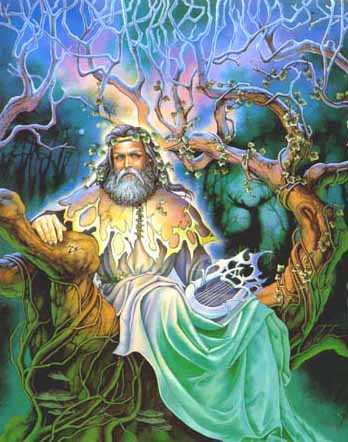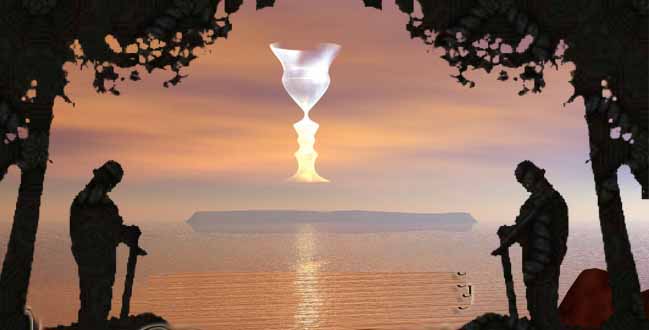AVALON
The Theosophy
King Arthur Pages

King Arthur’s
Marriage to Guinevere
Excalibur
Drawn
from the Stone or received from the Lady of the
Thomas
Malory’s Morte d’Arthur has both versions
with
both swords called Excalibur. Other versions
have
two different swords.
Excalibur or Caliburn (Caledfwlch in Welsh and
mentioned in the Mabinogion) is the legendary sword of King Arthur, sometimes
attributed with magical powers or associated with the rightful sovereignty of
Britain.
Sometimes Excalibur and the Sword in the Stone
(the proof of Arthur's lineage) are said to be the
same weapon, but in most versions they are considered separate. One Theory
postulates that the name Excalibur was originally derived from the Latin phrase
Ex calce liberatus, "liberated from the stone.” The sword was associated
with the Arthurian legend very early.
There are two originally separate legends about the
sword's origin. The first is the "Sword in the Stone" legend,
originally appearing in Robert de Boron's poem Merlin, in which Excalibur can
only be drawn from the stone by Arthur, the rightful king.
The second comes from the later Post-Vulgate Suite du
Merlin, which was taken up by Sir Thomas Malory. Here, Arthur receives
Excalibur from the Lady of the
As Arthur lies dying, he tells Sir Bedivere (Sir
Griflet in some versions) to return his sword to the lake by throwing it into
the water. Bedivere is
reluctant to throw away such a precious sword, so
twice he only pretends to do so. Each time, Arthur asks him to describe what he
saw. When Bedivere tells him the sword simply fell into the water, Arthur
scolds him harshly. Finally, Bedivere throws Excalibur into the lake. Before
the sword strikes the water's surface, a hand reaches up to grasp it and pulls
it under. Arthur leaves on a
death barge with the three queens to Avalon, where as
his legend says, he will one day return to lead in
Malory records both versions of the legend in his Le
Morte d'Arthur, and confusingly calls both swords Excalibur.
Theosophy
Avalon

King Arthur &
The Round Table

Merlin & The Tree of Life
Merlin
the Magician
Born
circa 400 CE ; Welsh: Myrddin;
Latin:
Merlinus; English: Merlin.

The Holy Grail
The Theosophy
King Arthur Pages
____________________
General pages
about Wales, Welsh History
and The History
of Theosophy in Wales
Theosophy
links
The Most Basic Theosophy
Website in the Universe
A quick overview of Theosophy
and the Theosophical Society
If you run a Theosophy Group you
can use this as an introductory handout.
Independent Theosophical Blog
One liners and quick explanations
About aspects of Theosophy
H P Blavatsky is usually the only
Theosophist that most people have ever
heard of. Let’s put that right
The Voice of the Silence Website
An Independent Theosophical Republic
Links to Free Online Theosophy
Study Resources; Courses, Writings,
A selection
of articles on Reincarnation
by Theosophical
writers
Provided in
response to the large
number of
enquiries we receive at
The Voice of the Silence Website
The Spiritual Home of Urban Theosophy
The Earth Base for Evolutionary Theosophy
Theosophical Glossary
Published 1892
A B C D EFG H IJ KL M N OP QR S T UV WXYZ
Try these if you are looking for a
local Theosophy
Group or Centre
UK Listing of Theosophical Groups
Wales
Theosophy Links Summary
All Wales
Guide to Theosophy Instant Guide to Theosophy
Theosophy
Wales Hornet Theosophy Wales Now
Cardiff
Theosophical Archive Elementary Theosophy
Basic
Theosophy Theosophy in Cardiff Theosophy
in Wales
Hey Look!
Theosophy in Cardiff Streetwise
Theosophy
Grand
Tour Theosophy Aardvark Theosophy Starts Here
Theosophy 206 Biography of William Q Judge
Theosophy Cardiff’s Face Book of Great Theosophists
Theosophy Evolution Theosophy Generally Stated
Biography of Helena Petrovna Blavatsky
Please click here for Current Theosophical Events in
Cardiff
Theosophy has no
dogma, no priesthood or diploma elite
and recognizes no spiritual head.
All ideas presented at meetings are for
consideration.
Please click here for Current Theosophical Events in
Cardiff
Cardiff Theosophical
Society in Wales